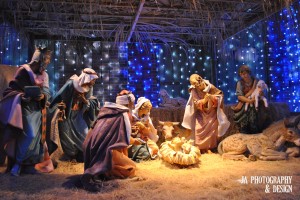About the author
More posts by Moderator
But how would he come? What would he be like? What would he do? Mountains would have bowed down. Seas would have roared. Trees would have clapped their hands. But the earth held its breath. As silent as snow falling, he came in. And when no one was looking, in the darkness, he came." - Jesus Storybook Bible

Most articles about Christmas begin with one of the Birth Narratives (Matthew 1-2 or Luke 2) or a combination thereof. That is of course a perfectly valid way to tell the Christmas story, in fact some might argue that it is the only ‘proper’ way to do so, something like the old TV series Dragnet, with detective Joe Friday’s, “just the facts, ma’am” approach. Of course the Gospel birth narratives are filled with plenty of facts, details surrounding the events leading up to and culminating in the actual birth of Christ. These are the source materials for countless Christmas plays and programs, Cantata’s, Living Christmas trees, Private and Public crèche displays and even many ‘secular’ television specials. The latter even include stories like A Christmas Carol or it’s a Wonderful Life where it is the sometimes not so obvious background theme. All these examples stem from and are driven by those few lines in two of the gospel accounts of the life of Jesus. The Gospel of Mark effectively skips the whole thing and jumps right in with the fully grown Jesus of Nazareth, though even it assumes the birth stories of both John the Baptist and Jesus the Christ even if latent in form. This Christmas season however, I’ll have to confess that though we will read the stories on Christmas day as always, for me Advent has taken on a new and deeper meaning as I have pondered the approach taken by the last gospel to be composed, that of the Apostle John.
Of course John’s whole gospel is unique and not just because it was written later. The later composition probably does reflect John’s knowledge of the other gospels and implies a desire on his part to not rehash story elements that were probably well known by the end of the first century. In fact John actually only records a couple of story elements from the life of Jesus that are included in the other three gospels. That is the other part of what makes his gospel so unique – he shares a series of different events in Jesus’ life with the express intent of convincing his readers to become followers of Christ (John 20.30).
However, John’s most powerful distinctiveness involves Advent or Christmas in its philosophical and theological scope and is seen in the first chapter, known as the prologue. Advent means arrival or coming and is that season in which committed followers of Christ celebrate the birth of our Lord Jesus Christ each year. The Latin adventius is the translation of the Greek word parousia, the same word used in the letters of Paul to reflect on the second coming of Christ. So when we celebrate Advent or Christmas we do so in the shadow of that final cosmic coming or in-breaking of God in human history. John’s gospel, more than any other new testament book, gives the celestial background of the manger story and explains that event in a manner that every person should ponder, like Mary, in the midst of all the pandemonium that the Christmas season brings.
Part of the reason this season has been different for me was a radio podcast I recently heard. The topic was not Christmas per se, but the host was throwing out the question of what was the most important verse in the bible. Many of the usual suspects were mentioned: Genesis 1.1, John 3:16, Paul’s reflection on the resurrection in 1 Corinthians 15 and a few others were mentioned. As he was discussing these I thought of John 1.1 which does come into play, but the host then quoted John 1.14 as his vote for the most important verse in the bible.
 When you think about it, John 1.14 is the Apostle John’s Birth Narrative. It is his statement in the prologue that is the primary source of the Christian doctrine of The Incarnation, the truth that in Jesus of Nazareth, the eternal God, specifically the second person of the Trinity, took on humanity: God became flesh in the form of a helpless baby born in what at best would be considered very poor circumstances. While the other gospels give a plethora of details surrounding the actual birth of the baby Jesus, the full idea of the incarnation, while not hidden, is certainly embryonic in its expression. John on the other hand seemingly considers the ordinary, even mundane events of the actual birth in Bethlehem as extraneous. He wants his audience to know that the WORD (logos) of verse one whose antiquity is even before Genesis 1.1, did something so beyond human comprehension that it cannot be overstated and which must be unambiguously expressed.
When you think about it, John 1.14 is the Apostle John’s Birth Narrative. It is his statement in the prologue that is the primary source of the Christian doctrine of The Incarnation, the truth that in Jesus of Nazareth, the eternal God, specifically the second person of the Trinity, took on humanity: God became flesh in the form of a helpless baby born in what at best would be considered very poor circumstances. While the other gospels give a plethora of details surrounding the actual birth of the baby Jesus, the full idea of the incarnation, while not hidden, is certainly embryonic in its expression. John on the other hand seemingly considers the ordinary, even mundane events of the actual birth in Bethlehem as extraneous. He wants his audience to know that the WORD (logos) of verse one whose antiquity is even before Genesis 1.1, did something so beyond human comprehension that it cannot be overstated and which must be unambiguously expressed.
He wants his readers to understand that the very one he is telling them about was not simply an ordinary human being, even though he was truly human. He wants his audience to understand that the one whom we celebrate in a myriad of ways throughout Advent, was God “Pitching his tent” among us so that we might see the actual glory of God. The word translated dwelt is literally “to tabernacle” or “to pitch tent’ and is a reflection on the presence of God in the Old Testament at Mount Sinai. John is saying God’s presence has come once again. In addition the concept is so modern that The Message can accurately convey it like this:
It seems to me that we don’t think of this often enough even during the Christmas season. We get excited about the idea of giving, even properly reflecting on Jesus as God’s greatest gift. But does it not seem that we have mired it in the arguments over allowing a crèche or nativity display or saying “Merry Christmas” or all the other things that believers and unbelievers focus on this time of year? Having a crèche or nativity display is a rather recent phenomenon, probably having first been used by St. Francis of Assisi for the simple purpose of inspiring worship of Christ. For our family, though we do have a manger scene, it is not a requirement to motivate us to worship Christ. When we consider John 1.14 we should discover all the incentive we need. That little baby, born in the most humble of circumstances, was God moving into our neighborhood so we could ‘see’ HIM with our own eyes. What a life! What a story! What an expression of the two key words John used: Grace and Truth! John virtually bursts with excitement because he himself had seen him physically and now wants those who have not to know about him…
~To Be Continued on Thursday
Awesome article;even if it's not finished yet!From the perspective of the disciple who leaned his head physically against the chest of Jesus and could have heard,literally heard his heart beat:This wonderful disciple accessed in a "spiritual"way Christ's heart and came up with such metaphysical terms as "light","life","love"not as they are in this realm,but in a realm of metaphysical transcendence,where compassion,love,forgiveness,go beyond the sadness of what seems to be our temporal mortal natural,tarnished religious failures,with its barriers,but by grace through Jesus,goes beyond our despair,bereavement,and sorrows,and links us supernaturally into,and with the One I need to know beyond any other unto a Transforming Life.Its only through John's gentleness that sheep may be beckoned to come,broken hearts condemned through natural religion,cross barriers of men's condemnation,find hope, by the somewhat irrational incomprehensible revelation of Jesus,the possibility of not "seeing" death,when death is all around us,His eternal Being revealed to John is that great,that wonderful.His eternal quest for our souls,is brought to a spiritual beckoning I and hopefully broken,fallen humanity,will heed.Through John,a guy like me,may,just may,evolve to also rest his head on the chest of our Lord,against all odds,and natural forces.Noel.
Thank you for your insightful article. Shortly after becoming a Christian, at the age of 15, I read the first chapter of John. I came away with the absolutely overwhelming feeling that God really understood me because He had come as a baby to connect with us. Whenever I am confused about life (and there has been a lot of life since I was 15!), I go back to John 1:14 to remember that God understands me because He came to dwell among common people. Not only that, He gave His life for them so that they might experience His eternal love and grace.
All,
From those of us who are old and decrepit, the "old guard", may God grant each of you a very Merry Christmas as we celebrate the birth of our Savior. My God also grant each of you a special New Year that prayfully will be full of repentance, forgiveness and healing.
Larne Gabriel
[…] Continued from Christmas Thoughts – Part 1: […]
May God truly bless you Larne